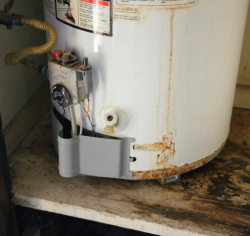When To Replace Your Water Heater
 When To Replace Your Water Heater
When To Replace Your Water Heater
Hot water is one of the most basic home necessities. Without it, you can’t shower, cook, clean or run the laundry machine. Water heaters are designed to last about 10 to 15 years. However, they can last longer if you take good care of them.
1. Water Heater Leaks
Leaks from your water heater can be an indication of serious issues. Often, you will find that the problem is not with the tank, but rather with the connections and fittings that connect the water heater to its pipes. This is particularly true of the water supply pipes that enter and exit from your heater. Check these for signs of leaks and tighten them to see if they fix the issue. Another common place for leaks is the nipples on top of the water heater, which are the threads that connect the heater to its pipes. This is where water enters and leaves the unit, which is vulnerable to leaks because of high pressure. If you have found that your leaks are coming from these areas, then it is time to replace your water heater. The sooner you act, the less damage will be done to your home.
2. Water Heater Not Warming Up
Water heaters are appliances that keep your home running by heating the water that comes in through your pipes. They typically last for about 10 years before they need some attention. Usually, they are powered by electricity and run on a dedicated circuit in your house. If you switch power sources, the water heater should still come on and heat your taps. If the water heater is gas-powered, a problem with the pilot light could be the culprit. This is a small probe that sits in the pilot flame and prevents the flow of gas if it detects that the light is not lit. This can be a tricky job that should be left to a professional. It may also be necessary to replace the thermocouple if it is not working properly.
3. High Utility Bills
If your electric bill suddenly seems higher than usual, it could be a sign that something is wrong with your water heater. Your water heater is one of the largest energy consumers in your home, accounting for about 18 percent of your power bill — the second-largest behind heating and cooling your home. The speed at which your water heater heats the water affects how efficiently it uses electricity, and a slow unit can send your utility bills skyrocketing. A faulty element, an inefficient thermostat, and a rusty dip tube are all factors that can cause your water heater to not heat up quickly enough. Replacing an element isn’t a high-cost repair and is a great way to ensure your water heater is operating at peak efficiency. Having a faulty dip tube replaced is another simple repair that can save you money in the long run.
4. Cold Water
If you’re taking a shower or washing dishes and suddenly you find your water is only coming out cold, that could be due to a number of issues. One of the most obvious signs is that your water heater is not heating up as quickly as it should be. The ideal operating temperature for a water heater is 122 to 140 degrees Fahrenheit. If your heater isn’t maintaining a temperature that’s high enough to prevent the growth of pathogens, it’s time for a replacement. Another telltale sign that it’s time for a new water heater is if you notice your water has an odd smell or taste. This is usually a sign of sulfate-reducing bacteria growing in your tank, which can make you sick.
5. Unusual Noises
A water heater is one of the most used appliances in your home, and it doesn’t take long before it starts to wear out. When it does, you’ll start to notice odd noises — sounds like hissing, screeching and tapping — that indicate that your water heater is no longer functioning properly. Unusual noises can also signal complex problems that should be left to professionals to handle, so be sure to call a Rooter Express plumber when you hear any unusual sounds coming from your water heater. Feel free to contact us here today: https://rooterexpressmb.net/water-heaters/
Categorised in: Water Heater, Water Heater Maintenance

 When To Replace Your Water Heater
When To Replace Your Water Heater